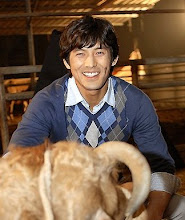
Walking in Dangerous Rain
I watched this movie some time ago. I couldn't take my eyes off it. Everything taking place onscreen was riveting, from the simple act of walking down a dark lonely road in the rain, to a wild chase by three desperate detectives. This movie held me in thrall.
As a new viewer of Asian movies at that time, I tried to analyze the reason I tend not to be interested in western works any longer. I finally came to the conclusion that it has to do with the accessibility of the players. They seem to be people first, actors by choice, and stars, by the public making them so.
In Memories of Murder, I saw this human factor almost too painfully. By the end of the story, I was in tears. Even now, the mood prevails. It's been so long since these crimes took place, and I don't know absolutely that they remain unsolved, but I think it's the case, and I think about that.
The actors have become the people in my mind, and the horrible sense of defeat that becomes palpable eventually, is heartbreaking. When one relates to the inroads made on the health; mental and physical; of the detectives, who are ultimately portrayed as tireless and completely dedicated to the case, you realize that you've watched something that is historic. You have seen the probable truth.
The way this movie draws you into it, so that you are walking through dangerous rain, with a warning shout in your throat as you see a potential victim, points to the brilliance of the director and the players.
It is difficult to say, "I love this movie", just as it is hard to say, I love Silence of the Lambs, because love is a peculiar word to use for such fare.
But yes, I love it for the fact that during it, I was in a small village in South Korea in a terrible era of air-raid warnings, military dictatorship, and the hopeless pursuit of a serial killer, and landed back here in this time and place with a thud, only after turning off the DVD player, and going to the kitchen for a glass of water. I was there, I felt the desperation, and I felt the defeat and the sorrow of the detectives, who were essentially decent enough human beings when all was said and done.
There are not many movies that can time-travel you into their present. This will do it.
I most seriously recommend that you view the interviews with the director and the stars (all of them are stars of a special kind in my mind) in order to dispel some of the hold the story will have on you.
These are incredibly interesting people, and it's a sheer joy to see them smiling and peaceful. They're intelligent, educated and articulate. The younger members of the cast, the less seasoned, are so beautiful in their desire to do it right.
They definitely did it right. They were wonderful, and they thanked the interviewer. How lovely that was to see.
I watched the movie using the English subtitles rather than the English dubbing because I wanted the authenticity of the real voices and sounds. The subtitles were very good.
(Note-they are excellent in fact. At the time I wrote this I hadn't yet had the exciting experience of trying to figure out what in hell all that strangely written dialogue across the screen means. I have now viewed enough K-Drama to realize there is no meaning a lot of the time that can actually be accused of having anything to do with the plot. So, "what does that mean?", is a question that will probably not be answered in my lifetime.)
H.








